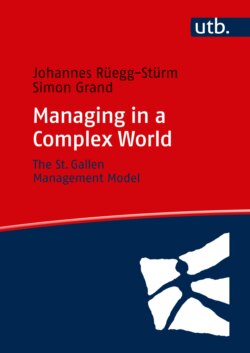Читать книгу Managing in a Complex World - Johannes Rüegg-Stürm - Страница 12
2.2 Value Creation as Organizational Achievement
ОглавлениеWhen an organization or a network of organizations creates value through division of labor, we speak of organizational value creation. Precisely this organizational value creation is the key point of reference for management.
Organizational value creation refers not only to what private enterprises achieve for their customers. Depending on organizational value creation and the environmental context, other types of organizations can be distinguished (→ INT, 2.5): nonprofit organizations (e.g., a purchasing cooperative), nongovernmental organizations (e.g., the ICRC), governmental organizations (e.g., public administration, schools, railways, post offices, the police, or the army). Such types of organizations often appear in mixed forms.
Nowadays, organizational value creation mostly has four basic characteristics: (1) coordinated division of labor; (2) specialization; (3) spatial and temporal distributedness; (4) the institutionalization of reliable cooperation.
These four characteristics are closely interconnected.
• In terms of the value creation outcome, division of labor means that an end product (e.g., a car) is divided into modules, each performing specific subfunctions for overall value creation. Similarly, an insurance service can be split into specific individual tasks and modularized task bundles. In terms of the value creation process, division of labor means that overall value creation, i.e., the activities required to manufacture a product or provide a service, is divided not only among different people but also among different subprocesses or organizations, which cooperate with each other in value creation chains (Figure 2).
Figure 2: Textile value creation chain [23]
• Division of labor, i.e., dividing overall value creation into subtasks, subprocesses and subfunctions, has one major advantage: It enables specialization, i.e., developing and applying specialized knowledge and skills. A task is not only distributed identically among a large number of actors. These actors, whether individuals, communities or organizations, may and must consciously endeavor to specialize. While the involved actors now only master specific individual activities of overall value creation, their in-depth competence and experience means they excel at their task.
Actor specialization often coincides with specializing the overall resource configuration. By resource configuration, we mean all the prerequisites that are available over time and whose interplay leads to developing, producing, and providing specific products and services. Such preconditions include financial resources, physical and technological infrastructures, location conditions, knowledge and know-how, permits or rights (e.g., licenses).
• Another characteristic of organizational value creation, in its intra- and interorganizational division of labor and specialization, is its spatial and temporal distributedness. Thus, different value creation activities are distributed sequentially or in parallel, staggered over time, and performed in various places (e.g., locations, buildings, rooms).
• Labor-division-based value creation depends on reliable, well-functioning collaboration. Enduring, robust, and goal-oriented collaboration needs to be institutionalized within an organization. By institutionalization, we mean developing a certain, lastingly stable, and person-independent practice (e.g., in a democracy, popular votes and electing members of parliament). Repeated enforcement makes such practices collectively self-evident. They can be based on both implicit rules and formalized regulations (→ TRA, 2.1 and 3.1).
Thus, institutionalizing labor-division-based collaboration enables this cooperation to be practiced as independently as possible of specific individuals. To this end, organizations serve as structured spaces of action for lastingly stabilizing labor-division-based cooperation (Barnard, 1938).
